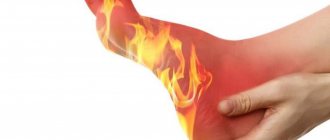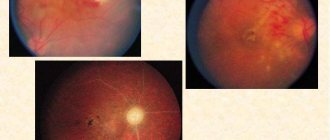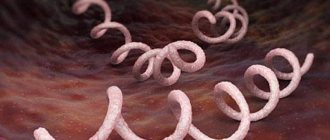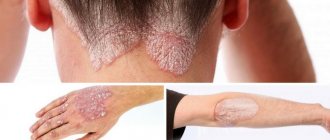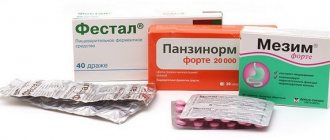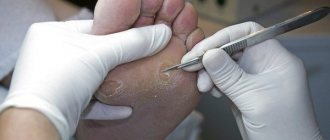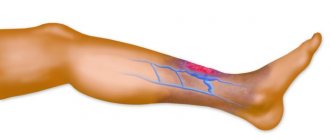Women of reproductive age who follow hygiene rules and do not have casual sexual partners should not have discomfort in the genital area. Itching and burning in the vagina are not a disease in itself; they are only among the main symptoms of various pathologies. Self-diagnosis and self-medication can aggravate the problem; only a doctor can determine the exact cause of the discomfort.
Related articles:
Causes of itching in the anus in women Treatment for itching in the intimate area during pregnancy Itching in the intimate area in women: treatment at home Getting rid of itchy skin at home - quickly and effectively Causes of itching in the groin in men: symptoms and treatment
Burning sensation in the vagina: causes leading to pathology
In medical practice there are many provoking factors that lead to the above symptoms. Therefore, even during a visual examination, the gynecologist cannot identify the true pathology. Especially if the disease is in an advanced form, and the patient has repeatedly tried to get rid of it on her own using broad-spectrum drugs (antibiotics).
Such medications, if taken incorrectly, can destroy beneficial lactobacilli, completely disrupt the vaginal microflora and lead to the proliferation of pathogenic microorganisms. We list the main factors that cause itching and burning in the vagina and genitals.
Mechanism of occurrence and causes of itching
Vaginal itching is not a disease, but only a symptom. The sensation of itching and burning is provoked by the inflamed walls of the organ. The brain's response to inflammation is weak pain signals, which the body recognizes as vaginal itching. This obsessive desire to scratch remains even after washing and rubbing. Such sensations should make a woman wary, pay attention to accompanying signs, and consult a doctor.
It is necessary to clearly understand that the causes of discomfort, itching, and burning must be identified in order to avoid consequences. Only a doctor will tell you how to treat the disease after an examination.
Taking medications with an unknown diagnosis can blur the picture of the disease.
The reasons are usually divided into 3 types:
- gynecological diseases;
- venereal diseases;
- other factors.
STDs (sexually transmitted infections)
Discomfort in the female genital area is often associated with the presence of an infection that is transmitted through sexual contact. The list of such diseases is extensive: chlamydia, herpes, papillomavirus, gonorrhea, syphilis, ureaplasmosis, gardnerellosis, trichomoniasis, etc. Some infections are difficult to recognize, so you have to take tests more than once, and after careful therapy do a control smear.
Clear signs of infection may not be observed for a long time, so many women perceive a slight burning sensation in the vagina as normal and are in no hurry to visit a doctor. STDs never disappear on their own, but become latent.
Allergy
It has long been known that most contraceptives provoke a negative reaction in the form of itching, rash, burning or pain. Typically, high allergenicity is attributed to vaginal suppositories, tablets and lubricants that contain harmful chemical components. To avoid such problems, consultation with gynecologists is recommended.
Contraceptives for oral administration are prescribed strictly taking into account individual characteristics. Self-selection of medications can cause unpredictable consequences from hormonal imbalance to infertility. Often the factor causing unpleasant phenomena is latex. In this case, it is advisable to choose an alternative to condoms.
Hormonal imbalance
Doctors often hear complaints of burning in the vagina after sex from women with hormonal imbalances. There are many reasons for this: pregnancy, puberty, menopause, undermined emotional background, endocrine pathologies, chronic diseases and other diseases of internal organs. What we see as a result: vaginal secretions decrease, the production of estrogen (female hormones) decreases, the mucous membrane becomes thinner and atrophies, and this leads to discomfort.
Symptoms of erosion
The main manifestation of itching is the presence of discomfort in the vagina, accompanied by an obsessive and quite strong desire to scratch the perineum. Sometimes the feeling of itching, burning or dryness can be relieved for a while by using a washcloth, douching, or simply washing the genitals with cool water. Typically, such an unpleasant feeling is accompanied by other clinical manifestations:
- dryness both inside the vagina and outside (vulva area). After using water or special solutions, the feeling of dryness subsides for a while;
- feeling that there is a foreign body inside the vagina;
- discharges of different nature. Often this is the symptom that appears in the presence of an STD, but discharge also appears in the case of a fungal infection of the vagina. The nature of the discharge can tell a lot to the gynecologist. For example, discharge that visually resembles cottage cheese is one of the signs of vaginal candidiasis;
- unpleasant odor from the vagina. Usually manifests itself due to specific secretions. After hygiene, it may disappear for a while, but then resumes again;
- presence of rashes on the genitals. Often, when you touch the affected areas, the feeling of itching intensifies and a burning sensation is noted;
- pain in the lower abdomen;
- bloody discharge (spotting). It is important here not to confuse such discharge with the onset of menstruation. It is not uncommon for a feeling of itching to occur before the onset of menstruation (especially in young girls and women who are approaching menopause).
The most obvious symptom of trichomoniasis is a watery, foamy discharge. They can vary in color from light yellow to gray-green.
Most often, it is this symptom that frightens patients, and only then they complain that they have itching in the vagina, burning when urinating, etc. On examination, swelling and redness of the vulva is observed.
Sometimes patients with trichomoniasis are bothered by itching in the vagina after sex.
Trichomonas in this disease are detected in gynecological smears, and can also be detected in a general urine test. Most often, there are still living pathogens in the urine. In addition, the PCR method, culture of material on a nutrient medium, or colposcopy are used for diagnosis.
A gynecological disease characterized by the formation of minor ulcers on the cervical mucosa. Most often, erosion is asymptomatic and is diagnosed accidentally during a routine visit to the gynecologist. Predisposing factors for the formation of erosion include:
- mechanical damage to the cervical mucosa;
- infections and STDs;
- violation of the body's protective functions;
- hormonal disorders.
As already mentioned, erosion is a disease that occurs in most cases without clinical signs, but in some cases pain may appear during sexual intercourse, spotting in the middle of the menstrual cycle, menstrual irregularities, nagging pain in the lower back and lower abdomen, itching into the vagina without discharge.
The presence of erosion can only be diagnosed by the attending gynecologist when examining the patient using the necessary instruments. To confirm the diagnosis, colposcopy is used, after which therapy is prescribed.
Treatment is carried out with medications and surgery. As a medicinal treatment, drugs for intravaginal use with antibacterial effects are used, as well as suppositories and ointments for the rapid regeneration of damaged cells.
During surgical treatment, erosion is cauterized with electric current or exposed to a stream of liquid nitrogen.
Symptoms of sexually transmitted diseases can be summarized in a table.
| Disease | Itching | Discharge | Other symptoms |
| Gonorrhea | Yes | green, purulent | pain in the lower abdomen, swelling, frequent urge to urinate |
| Syphilis | Yes | No | chancre, ulcers |
| Chlamydia | No | No | lower abdominal pain or asymptomatic course |
| Trichomoniasis | Yes | yellow-green, foamy | bad smell |
| Genital herpes | Yes | No | rashes, swelling, pain |
In the acute form of the disease, itching in and around the vagina is felt especially strongly. Often patients complain that the vulva area burns and stings. Over time, the pain weakens and the disease becomes chronic.
Inflammatory phenomena
The penetration of opportunistic bacteria into the mucous membrane can cause a number of inflammatory diseases in the genitourinary area and, as a result, a burning sensation in the vagina. Symptoms, depending on the stage and nature of the disease, may vary. Primacy is given to vaginitis - this is an infectious and inflammatory condition of the vaginal microflora. It causes unpleasant symptoms such as burning, severe itching, soreness, swelling and dysuria.
Bacterial vaginosis takes second place. Characteristic signs of this pathology are a cheesy discharge with an unpleasant sour odor, a constant feeling of itching and burning in the vaginal and genital areas. Third place went to candidiasis or thrush. If the disease is not treated, an inflammatory process may occur against its background.
In addition to the listed pathologies, similar symptoms are observed with colpitis, cervical erosion, cervicitis, cystitis, vulvitis, adnexitis, endometritis and other diseases of the reproductive system. The clinical picture is pronounced with weakened immunity.
Causes of burning in an intimate place in women
The main reason why irritation occurs in the intimate area may be insufficient or incorrect care of the skin of delicate areas. For example, you find yourself in a situation where you can’t wash yourself properly: you went hiking, or went on a long trip. Wet sanitary napkins can help a woman cope with the problem. They will not replace water, but they will reduce discomfort, burning and itching in intimate places in women.
If you are sure that the itching in the perineum is not due to insufficient self-care, and washing has nothing to do with it, then there are several options:
- allergy to soap or other detergent;
- underwear rubs the skin;
- genitals are damaged (irritation and itching occur due to depilation, use of scrubs, razor removal);
- abuse of medications (disturbs the vaginal microflora, which causes a burning sensation);
- chronic disease (diabetes mellitus, hypothyroidism, hepatitis);
- infection (chlamydia, genital herpes, trichomoniasis);
- fungal disease (candidiasis or thrush), bacterial vaginosis.
Irritation and acne
Before sounding the alarm, carefully analyze what your symptoms are, other than itching and burning. If noticeable irritation of the intimate area bothers you and pimples appear, take a closer look at them. Purulent red or bluish rashes in the bikini area may mean that the sebaceous glands are inflamed. If the pimples are white and their contents are light and watery, the cause is molluscum contagiosum. It is easy to “pick up” in the pool. Rashes in the pubic area, bikini area and anus are often signs of sexually transmitted diseases. Such acne is always accompanied by severe itching of the perineum.
Find out what molluscum contagiosum is - treatment and symptoms of the disease.
Dryness and redness
Often, along with a burning sensation in the intimate area, women experience redness of the skin of the labia and a feeling of dryness in the vagina. This condition indicates that there is a fluctuation in estrogen levels in the body. This hormone is responsible for the blood supply to the vagina, the production of mucus, and the creation of an optimal acidic environment for the vaginal microflora.
Dryness in intimate places is caused by excessive physical exertion, a side effect of certain medications, or incorrectly selected oral contraceptives. Alcohol, smoking, douching and even constant stress affect the natural female microflora. Vaginal dryness is also a sign of age-related changes and menopause; in this case, the doctor will recommend hormonal ointments and suppositories and tell you how to moisturize the intimate area. Now there are special moisturizers for daily use.
- Vertebral artery syndrome with cervical osteochondrosis - symptoms. How to treat vertebral artery syndrome at home
- How to open a bottle of wine without a corkscrew
- How to prepare chicken marinade in the oven
Pain when urinating
Both an adult woman and a girl can experience these unpleasant sensations. The cause of pain, pain, and burning when urinating is often cystitis. This means that an infection has entered the urethra. Microbes affect the walls of the bladder, they become inflamed, and sharp pain appears. This disease often occurs in girls of preschool and primary school age, and in adult women. A painful trip to the toilet is a reason to consult a gynecologist or urologist. Microbes enter the genitourinary system in several ways:
- ascending, when the infection goes from bottom to top, this is due to poor intimate hygiene;
- descending, then the inflammatory process comes from the kidneys;
- entry of pathogenic microorganisms through the blood;
- spread of infection through the lymph (from the woman’s genitals).
Burning after sex
Often women complain to the gynecologist about itching and burning in the vagina after sex. There are several possible reasons for this phenomenon. The most common is thrush (candidiasis), it is caused by the fungus Candida. If tests confirm the presence of the disease, you will be prescribed a topical antifungal drug. Treatment for thrush lasts about two weeks, and to prevent exacerbation, the course is prescribed not only to the patient, her partner will also have to take pills.
Signs of candidiasis:
- white discharge of a cheesy appearance, with a sour smell and after sexual intercourse has taken place, it becomes more abundant;
- itching, burning in the vaginal area, intensifying after intimacy;
- pain that is felt during and after sexual intercourse.
The cause of burning after intimate contact is an allergy to one of the components of the condom: latex, flavoring. The man is a participant in solving the problem; he has to choose something neutral that is not an allergen for his partner. And a woman is recommended to use restorative products to eliminate all symptoms.
Hygiene procedures and hair removal shortly before intimacy are another possible cause of discomfort after sex. The skin is already irritated, there are microcracks on it from razors, and then there is an additional traumatic factor. All together causes discomfort in women’s intimate places. Dry, damaged skin will benefit from mild soothing, moisturizing ointments, creams or gels.
Discomfort before menstruation
Often girls complain of itching and burning in the vagina shortly before menstruation. Some people periodically itch the labia minora, clitoris, and feel dryness in the intimate area. If this is a constant phenomenon, hormonal changes may be the cause. Estrogen levels decrease before menstruation, the vaginal microflora is disrupted, and an unpleasant burning sensation appears in the lower abdomen. Sometimes discomfort before menstruation is caused by infectious diseases; if there is a feeling of exacerbation, atypical pain, or previously unfamiliar itching, then you need to go to the doctor.
- Stuffed potatoes - recipes with photos. How to cook stuffed potatoes in the oven or slow cooker
- Exercises for hernia of the lumbar spine
- Chicken noodle soup - recipes. How to cook chicken noodle soup, video and photos
During pregnancy
During pregnancy, a woman is in an “altered state of the body.” Her hormonal levels are rearranged, her usual diet is disrupted, and doctors prescribe medications for better bearing of the baby. All these factors accumulate, layer on top of each other, and one of them, or a combination of several, leads to discomfort in the genital area.
Allergies to foods or medications can provoke a burning sensation in the intimate area in pregnant women. A common cause of itching is stressful situations. A pregnant woman feels psychological discomfort, and, directly, at these moments she wants to itch. In the second half of gestation, itching and burning of the genitals are considered one of the manifestations of toxicosis. There is also a possibility of infection.
After taking antibiotics
Itching in the vagina, burning sensation in the genital area after a course of antibiotics are caused by dysbacteriosis. Medicines that kill bacteria disrupt the natural flora of not only the intestines, but also the vagina. The body loses its natural defenses against pathogenic pathogens, “bad” bacteria actively multiply, and vaginal dysbiosis occurs. Its signs:
- burning and itching in the intimate area;
- unpleasant-smelling discharge;
- pain in the lower abdomen;
- burning, stinging, itching when urinating.
Other reasons
But itching, pain and burning in the vagina are not always caused by inflammation and diseases of the pelvic organs. Often, upon examination, it is discovered that discomfort is associated with other pathologies. These include:
- helminthic infestations;
- hemorrhoids;
- malignant and benign formations of the rectum;
- stones in the kidneys and bladder;
- chronic constipation;
- scabies or lice pubis;
- diabetes;
- renal failure.
Similar symptoms appear in gastrointestinal disorders, various dermatitis, leukemia, anemia, and psychogenic pathologies. As you can see, the list of diseases that cause a similar picture is rich and requires the attention of a specialist.
Diagnostics
To accurately determine the disease, the gynecologist performs an initial visual examination (with a mirror), listens to all the patient’s complaints and is guided by accompanying factors: discharge, pain, swelling, swelling, redness, pain, etc. After this, diagnostic measures are prescribed - taking appropriate tests:
- general smear;
— bacteriological analysis for hidden infections;
— Pap test to detect cancerous tumors;
— PCR and ELISA for the determination of papalomavirus, chlamydia, ureaplasmosis and mycoplasmosis.
An ultrasound and colposcopy may also be required. Blood samples, urine and stool tests are required. If necessary, a scraping is made from the anus. Based on the results of completed tests, complex therapy is established (outpatient or inpatient), which will eliminate the cause of the disease and the current symptoms (itching, discomfort, dryness and burning in the vagina).
Diagnosis, which doctor to see, and what tests are needed
If you have symptoms of thrush or vaginal itching, you should consult a gynecologist or venereologist. Before prescribing drugs, diagnostics are carried out for further effective treatment.
This is a necessity; due to different pathologies, the treatment method may vary.
After reporting complaints of itching to the hospital, an examination will be scheduled:
- Ultrasound of the pelvic organs.
- Flora smear.
- Sowing on nutrient media.
- Research using the PRC method.
If necessary, a woman can be referred for consultation to specialized specialists (venereologist, dermatologist, allergist).
After the examination and test results, treatment is prescribed. It directly depends on what caused this discomfort. Self-medication is unacceptable; it can only aggravate the discomfort.
To eliminate the cause of itching, the attending physician may prescribe:
- Antihistamines - if test results reveal an allergic reaction.
- Antimicrobial tablets, injections or suppositories - when the cause of such sensations is an infectious process.
- Antifungal agents - when microorganisms of this type are identified.
- Hormonal drugs.
- Vaginal suppositories.
Drug treatment can be supplemented with folk remedies, which are based on plant extracts that have regenerative and antibacterial properties. An advantage to this feature is that they help relieve itching quite gently.
Treatment is medicinal
When diagnosing an STD, you cannot do without antibacterial drugs. Both sexual partners should undergo therapeutic measures, and sexual relations should be excluded during the treatment period or condoms should be used. To nourish and soften the vaginal walls, intravaginal suppositories (Ovestin, Terzhinan, Estrocad) are prescribed.
In case of dysbacteriosis, products containing lactobacilli are prescribed to normalize the microflora. A diet is being developed. All unhealthy foods (fried, salty, bitter, sweet, smoked) are removed from the menu and fermented milk dishes are added. If a burning sensation in the vagina is caused by an allergy to contraceptives, the doctor will select a replacement.
Folk recipes
In combination with traditional therapy, it is possible to use various decoctions and infusions based on herbal components, but only after consulting a specialist. The following solution for internal douching has an anti-inflammatory effect: take a tablespoon of a mixture of calendula or chamomile and stinging nettle, stir in a glass of boiling water.
The following infusion has a similar effect: for half a liter of water you will need a little potassium permanganate (until light pink) and three liters of milk. Douche with the prepared liquid up to five times a day.
A decoction of nettle, Veronica officinalis and calendula will help get rid of burning and itching in the genitals.
Approach the problem wisely after accurately determining the existing disease, and then unpleasant moments in the intimate sphere will not affect you.
Vaginal itching after intercourse
Vaginal itching can also bother a woman after anal sex if her partner has an infection in the vagina - bacteria found in the intestines, such as E. coli. Such infections cause severe inflammation of the appendages, but it all starts with itching.
If you feel itching in your intimate area, do not waste time, contact a gynecologist. In addition to infections, itching is a symptom of incipient genital cancer. The doctor will conduct an examination and take smears for infections and oncology - all together this will not take more than 15 minutes, but will allow you to identify the cause in time and quickly recover. Advanced gynecological diseases are treated long and difficult, and sometimes end in complete removal of organs. So is it worth bringing the situation to such an outcome?
ONLINE REGISTRATION at the DIANA clinic
You can sign up by calling the toll-free phone number 8-800-707-15-60 or filling out the contact form. In this case, we will contact you ourselves.
If you find an error, please select a piece of text and press Ctrl+Enter

